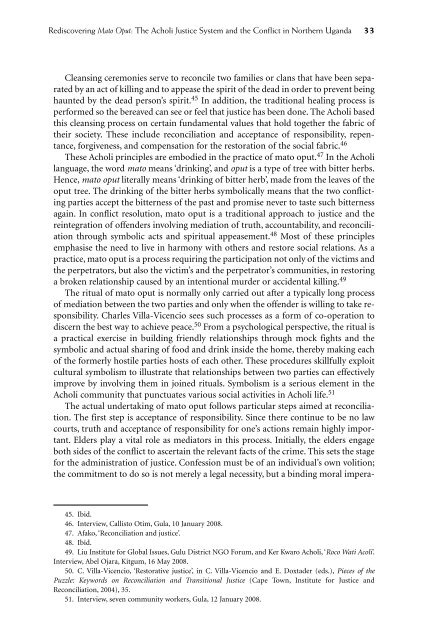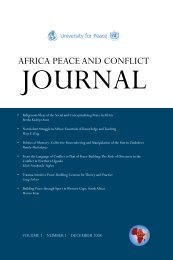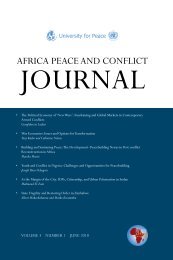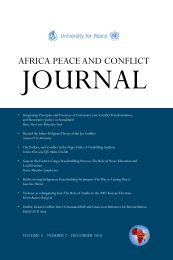Download - Africa Peace and Conflict Journal - The University for ...
Download - Africa Peace and Conflict Journal - The University for ...
Download - Africa Peace and Conflict Journal - The University for ...
You also want an ePaper? Increase the reach of your titles
YUMPU automatically turns print PDFs into web optimized ePapers that Google loves.
Rediscovering Mato Oput: <strong>The</strong> Acholi Justice System <strong>and</strong> the <strong>Conflict</strong> in Northern Ug<strong>and</strong>a 33Cleansing ceremonies serve to reconcile two families or clans that have been separatedby an act of killing <strong>and</strong> to appease the spirit of the dead in order to prevent beinghaunted by the dead person’s spirit. 45 In addition, the traditional healing process isper<strong>for</strong>med so the bereaved can see or feel that justice has been done. <strong>The</strong> Acholi basedthis cleansing process on certain fundamental values that hold together the fabric oftheir society. <strong>The</strong>se include reconciliation <strong>and</strong> acceptance of responsibility, repentance,<strong>for</strong>giveness, <strong>and</strong> compensation <strong>for</strong> the restoration of the social fabric. 46<strong>The</strong>se Acholi principles are embodied in the practice of mato oput. 47 In the Acholilanguage, the word mato means ‘drinking’, <strong>and</strong> oput is a type of tree with bitter herbs.Hence, mato oput literally means ‘drinking of bitter herb’, made from the leaves of theoput tree. <strong>The</strong> drinking of the bitter herbs symbolically means that the two conflictingparties accept the bitterness of the past <strong>and</strong> promise never to taste such bitternessagain. In conflict resolution, mato oput is a traditional approach to justice <strong>and</strong> thereintegration of offenders involving mediation of truth, accountability, <strong>and</strong> reconciliationthrough symbolic acts <strong>and</strong> spiritual appeasement. 48 Most of these principlesemphasise the need to live in harmony with others <strong>and</strong> restore social relations. As apractice, mato oput is a process requiring the participation not only of the victims <strong>and</strong>the perpetrators, but also the victim’s <strong>and</strong> the perpetrator’s communities, in restoringa broken relationship caused by an intentional murder or accidental killing. 49<strong>The</strong> ritual of mato oput is normally only carried out after a typically long processof mediation between the two parties <strong>and</strong> only when the offender is willing to take responsibility.Charles Villa-Vicencio sees such processes as a <strong>for</strong>m of co-operation todiscern the best way to achieve peace. 50 From a psychological perspective, the ritual isa practical exercise in building friendly relationships through mock fights <strong>and</strong> thesymbolic <strong>and</strong> actual sharing of food <strong>and</strong> drink inside the home, thereby making eachof the <strong>for</strong>merly hostile parties hosts of each other. <strong>The</strong>se procedures skillfully exploitcultural symbolism to illustrate that relationships between two parties can effectivelyimprove by involving them in joined rituals. Symbolism is a serious element in theAcholi community that punctuates various social activities in Acholi life. 51<strong>The</strong> actual undertaking of mato oput follows particular steps aimed at reconciliation.<strong>The</strong> first step is acceptance of responsibility. Since there continue to be no lawcourts, truth <strong>and</strong> acceptance of responsibility <strong>for</strong> one’s actions remain highly important.Elders play a vital role as mediators in this process. Initially, the elders engageboth sides of the conflict to ascertain the relevant facts of the crime. This sets the stage<strong>for</strong> the administration of justice. Confession must be of an individual’s own volition;the commitment to do so is not merely a legal necessity, but a binding moral impera-45. Ibid.46. Interview, Callisto Otim, Gula, 10 January 2008.47. Afako, ‘Reconciliation <strong>and</strong> justice’.48. Ibid.49. Liu Institute <strong>for</strong> Global Issues, Gulu District NGO Forum, <strong>and</strong> Ker Kwaro Acholi, ‘Roco Wati Acoli’.Interview, Abel Ojara, Kitgum, 16 May 2008.50. C. Villa-Vicencio, ‘Restorative justice’, in C. Villa-Vicencio <strong>and</strong> E. Doxtader (eds.), Pieces of thePuzzle: Keywords on Reconciliation <strong>and</strong> Transitional Justice (Cape Town, Institute <strong>for</strong> Justice <strong>and</strong>Reconciliation, 2004), 35.51. Interview, seven community workers, Gula, 12 January 2008.






